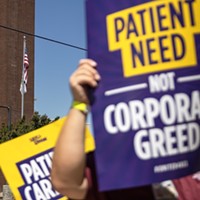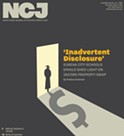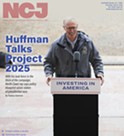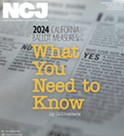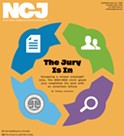Thursday, July 30, 2020
Column Quotes HumCo Nurse Tying Fatal COVID-19 Cases to Meth Dealer who Refused to Isolate
Posted By Thadeus Greenson @ThadeusGreenson on Thu, Jul 30, 2020 at 4:28 PM
The strain of COVID-19 infection that ultimately killed four residents at Alder Bay Assisted Living reportedly started with a methamphetamine dealer who dismissed public health’s advice and refused to isolate himself, Humboldt County Public Health Nurse Erica Dykehouse reportedly told famed author Michael Lewis, who was penning a column for Bloomberg.
Lewis’ column, “Confessions of a California COVID Nurse,” focuses on Dykehouse’s contact tracing investigations, in which she works backward from a positive COVID-19 test, trying to find everyone the new positive case may have exposed to the deadly virus. It offers some illuminating insight into the job, as a well as a level of detail about cases that local officials to date have refused to offer.
An excerpt:
Humboldt County Joint Information Center lead public information officer Heather Muller declined to confirm the case-specific details of Lewis' reporting.
"Some pieces of information were shared with the reporter that could compromise the privacy of those involved," Muller wrote in an email to the Journal. "Because of that, the Joint Information Center cannot confirm this information."
Elsewhere in the column, Dykehouse is quoted as saying that while criteria has changed repeatedly over the course of the pandemic, since June her contact investigations have generally focused on a single question: Who have you been within 6 feet of for more than 15 minutes? But aside from the case-specific details, the largest takeaway from the column is Dykhouse saying more and more people are no longer cooperating with contact investigations and are instead hanging up on her, not returning her calls or lashing out.
In her email to the Journal, Muller said Dykehouse's views don't necessarily reflect those of the county.
"The interview reflects the impressions and experiences of the employee who participated in it and does not necessarily reflect the broader experience of Public Health employees or the status of the ongoing operation," she wrote before pivoting to stressing the importance of timely testing. "When a county as small as ours gets a particularly large cluster of cases we risk overwhelming our resources. This is why testing and contact tracing are so important."
Since July 1, Humboldt County has confirmed 95 new COVID-19 cases, 42 percent of the county’s total caseload to date.
Lewis is the author of more than a dozen books, including Liar’s Poker, Moneyball, The Blind Side, The Big Short and Flash Boys. His full Bloomberg column is worth a read and can be found here.
Lewis’ column, “Confessions of a California COVID Nurse,” focuses on Dykehouse’s contact tracing investigations, in which she works backward from a positive COVID-19 test, trying to find everyone the new positive case may have exposed to the deadly virus. It offers some illuminating insight into the job, as a well as a level of detail about cases that local officials to date have refused to offer.
An excerpt:
"Two cases stuck in Erica’s mind. One was a couple in their 70s, both possibly contagious. She’d found them, told them to quarantine, and they had turned right around and hosted a big Fourth of July BBQ. When she tried to contact guests who might have been infected, she found them either dismissive or outright rude. “You have these whole little social networks that are hostile,” she said. “Most of of the time they are polite enough just to hang up. But I’m trying to develop a thick skin.”
The other case that stuck in her head was the meth dealer. The Public Health nurses had gotten to him soon after he’d been infected and, though he was dismissive of their advice, said he would isolate himself. Erica suspected he was still sneaking out at night, and her suspicion was confirmed when he infected a buddy of his, who in turn infected his daughter-in-law. The buddy’s daughter-in-law, who had no symptoms, went to her job at Alder Bay Assisted Living, a nursing home in Eureka. More than a dozen staff members and residents became infected. Four died.”
Humboldt County Joint Information Center lead public information officer Heather Muller declined to confirm the case-specific details of Lewis' reporting.
"Some pieces of information were shared with the reporter that could compromise the privacy of those involved," Muller wrote in an email to the Journal. "Because of that, the Joint Information Center cannot confirm this information."
Elsewhere in the column, Dykehouse is quoted as saying that while criteria has changed repeatedly over the course of the pandemic, since June her contact investigations have generally focused on a single question: Who have you been within 6 feet of for more than 15 minutes? But aside from the case-specific details, the largest takeaway from the column is Dykhouse saying more and more people are no longer cooperating with contact investigations and are instead hanging up on her, not returning her calls or lashing out.
“Early on, they’d been cooperative. Though no one was pleased to hear they had COVID-19, people respected her authority. They behaved much as people had before the pandemic, when she told them they needed to isolate themselves. … And they did their best to comply — at least until the middle of May, just after the state’s shelter-in-place order was lifted. From that point on, her diary tells the story of a discomfiting change. People had less and less interest in what she had to say: they seemed to think they knew everything they needed to know. ‘A lot of these people are getting their medical information off Facebook,’ said Erica. People stopped returning her calls. People hung up on her. People even lashed out at her. ‘It’s the first time in this job I’m experiencing people hanging up on me — except with STDs,’ said Erica. ‘Most of the time you call and say, ‘I’m a nurse from Public Health’ and they talk to you or call you back. We’re used to people trusting us. Now they don’t. That’s been very weird.’ … But by late June, Erica and her colleagues sensed that everything was moving in the wrong direction. ‘We feel like we’re losing control of the situation,’ one of the county health officers said. ‘People are getting it and we don’t know where.’”
In her email to the Journal, Muller said Dykehouse's views don't necessarily reflect those of the county.
"The interview reflects the impressions and experiences of the employee who participated in it and does not necessarily reflect the broader experience of Public Health employees or the status of the ongoing operation," she wrote before pivoting to stressing the importance of timely testing. "When a county as small as ours gets a particularly large cluster of cases we risk overwhelming our resources. This is why testing and contact tracing are so important."
Since July 1, Humboldt County has confirmed 95 new COVID-19 cases, 42 percent of the county’s total caseload to date.
Lewis is the author of more than a dozen books, including Liar’s Poker, Moneyball, The Blind Side, The Big Short and Flash Boys. His full Bloomberg column is worth a read and can be found here.
Speaking of...
Comments (4)
Showing 1-4 of 4
Readers also liked…
more from the author
-
Jackson's Retreat
The contract clause that allowed Cal Poly Humboldt's embattled president to step down into a high-paid instructional position
- Jul 25, 2024
-
'Profound Concern'
Alleged victim distressed by DA's handling of hate speech, antisemitic threats case
- Jul 25, 2024
-
'Inadvertent Disclosure'
Eureka City Schools emails shed light on Jacobs property swap
- Jul 25, 2024
- More »


